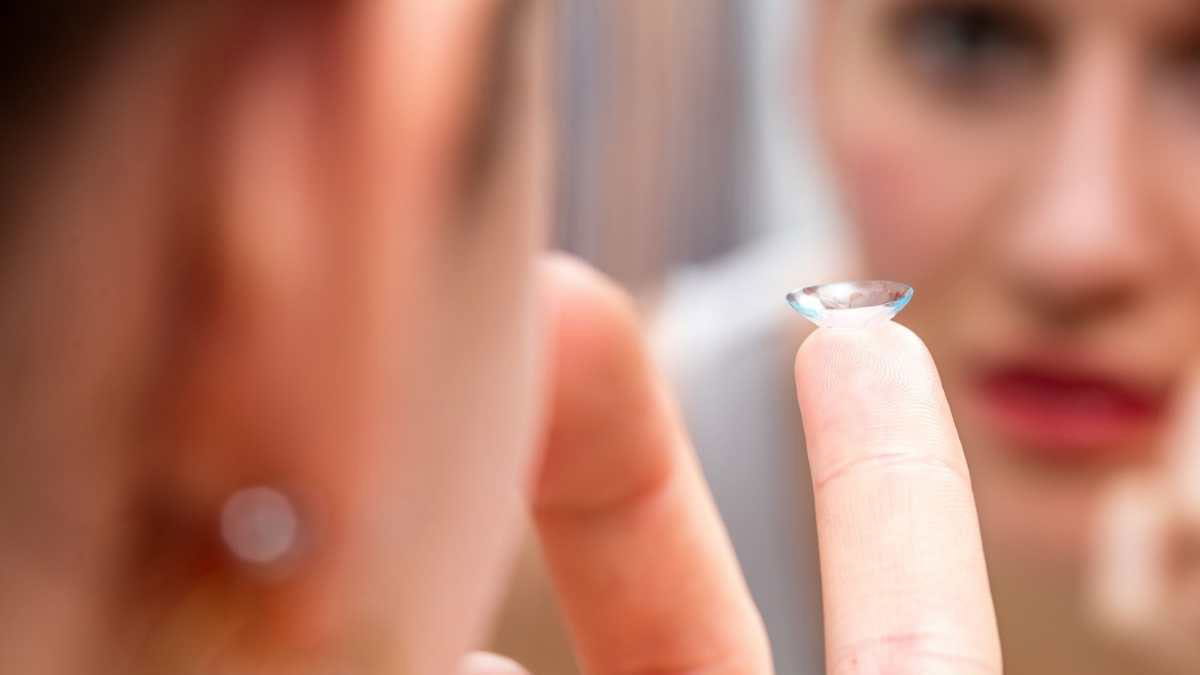Blog article
How should you clean and care for contact lenses?

For many people, contact lenses can be freeing. They can give you the incredible gift of clearer vision, without some of the inconveniences you might experience with glasses.
But it’s essential to take care of them properly to prevent discomfort and infections, which can potentially be serious.1
Here, OPSM optometrist Elizabeth Kodari shares some top tips.
In this article
- Always wash your hands first
- Tips for putting in and taking out contact lenses
- How should you clean your contact lenses?
- When to replace your contact lenses
- Tips for staying overnight
- If your eyes are red, sore or irritated, see your optometrist
- Does health insurance cover contact lenses?
Always wash your hands first
This is the number one rule for wearing contact lenses, Kodari says.
“Before handling your contact lenses, wash your hands thoroughly with soap and water and dry with a lint-free towel,” she says.
“This is important to make sure you don’t transfer bacteria from your hands to your eyes, where it could cause an infection.”
Affordable optical cover with HBF
Tips for putting in and taking out contact lenses
There are different types of contact lenses, and your optometrist will show you the best way to put them in and take them out.
Kodari says a few good tips are:
- Check that the contact lens has not turned inside out before inserting it. “If you look at it side-on, it should be a smooth bowl shape, without the edges flaring out,” Kodari says.
- Check that the lens is clean, clear and undamaged. If it’s a bit dirty, give it a clean with fresh solution first.
- If the lens is damaged, don’t put it in your eye.
- Put your lenses in before applying any makeup and take them out before removing makeup.
- Be careful with long fingernails not to damage the lens.
- Put the plug in the sink first – you don’t want to lose a lens down the drain!
Save at OPSM with HBF Member Perks
How should you clean your contact lenses?
It’s important to clean your contact lenses each time you take them out and store them in a clean lens case filled with fresh solution.1
“Cleaning solutions remove any build-up of unwanted deposits, such as oils and proteins,” Kodari explains.
“If these deposits are left on your lenses, you may feel discomfort or eye irritation, and your contacts may not last as long as they should.”
Kodari’s tips include:
- Follow your optometrist’s advice on how to clean your lenses – the appropriate products and steps can differ depending on what type of lenses you have.
- Don’t use tap water or saliva on your contact lenses or lens case, as this can increase risk of infection.
- Check the expiry date on your contact lens solution and don’t use it if it’s expired.
- Always clean out your lens case with contact lens solution and replace it frequently.
6 myths about your vision – and the facts
When to replace your contact lenses
“Different contact lens types are designed to be worn for different lengths of time,” Kodari says.
This goes both for how many hours you should wear them each time, and how long you can reuse the same pair (which may be one day, two weeks, a month, or up to a few years for some hard lenses).
“Replace your contact lenses as recommended by your optometrist to reduce the risk of infection,” Kodari says.
“Overwear of contact lenses can lead to irritation or infection, whereas brand new contacts give your eyes a feeling of refreshment – just like putting on clean clothes.”
Tips for staying overnight
If you won’t be home when it’s time to take out your contacts, make sure you’ve got everything you need with you – a storage case, cleaning solution and your glasses.
“Don’t sleep in your contact lenses. This can increase your risk of infection and other potentially serious problems,” Kodari says.
“Speak to your optometrist about whether daily disposable contact lenses maybe a suitable option.”
If your eyes are red, sore or irritated, see your optometrist
“If you’re experiencing any discomfort or irritation with your eyes, don’t ignore it,” Kodari says.
“Take a break from your contacts and make an appointment with your optometrist, so they can assess what’s causing it and advise on the best solution.”
Does health insurance cover contact lenses?
HBF optical cover can give you 100% back on prescription glasses and contact lenses, up to your annual limit.
If you’re an HBF member, you can check what you're covered for by logging on to myHBF or calling us on 133 423.
Save at OPSM with HBF Member Perks
HBF health members can save at OPSM with special offers on glasses and contact lenses.*
Visit HBF Member Perks to view current offers.
1 OPSM - Contact lens tips
*Special offers and member benefits available through HBF Member Perks are provided by third party suppliers and subject to the suppliers’ terms and conditions, including their cancellation and refund policies. Please ensure you consider their terms and conditions prior to purchasing the discounted offer or benefit. Visit HBF Member Perks for full details.
This article contains general information only and does not take into account the health, personal situation or needs of any person. In conjunction with your GP or treating health care professional, please consider whether the information is suitable for you and your personal circumstances.



